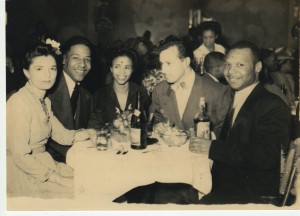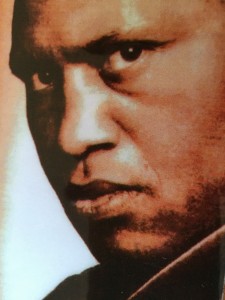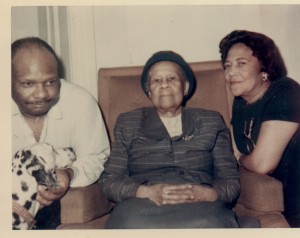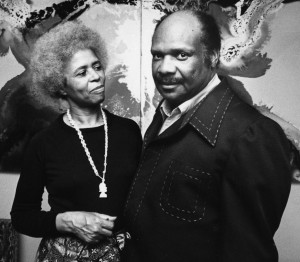Once again, it’s time to dance, sing-a-long and savor black music. And you’ll have a whole month to do it.
Dating back to the late 1970s, music industry insiders Kenny Gamble, Ed Wright and Dyana Williams came up with the idea to set aside one month to honor the cultural importance and influence of black music and musicians.
June became that month. And there’s little doubt that if he were alive today, writer Richard Durham would have led the celebration charge.
In this photo, Richard Durham (smiling on the right) enjoys great music and good company in the popular Chicago South Side nightclub, Club DeLisa, in 1942. From left to right are Phyllis Peltz, Durham’s younger brother Earl and Durham’s wife Clarice, along with Phyllis’ husband and fellow scriptwriter, David Peltz.
Durham loved music. In his Chicago home Durham played, repeatedly, the records of the African American musicians he revered. And this love often fed his creative writing efforts.
For example, in his award-winning Destination Freedom radio drama series about black heroes and heroines (WMAQ, 1948-1950), Durham dramatized the lives of musicians as varied as composer/bandleader Duke Ellington, contralto Marian Anderson, and pianist Fats Waller. In addition, Durham explored the formative years of trumpeter/singer Louis Armstrong, organist Hazel Scott, and pianist/singer Nat King Cole.
In one Destination Freedom episode, Durham’s inventively revealed how prolific composer/arranger W.C. Handy came to be known as the father of the blues. Durham’s September 12, 1948 script began by presenting Handy as a naive teenager fascinated by the blues. Working as a water boy for a prison chain gang, Handy carried water to a prisoner named Lemon—Durham’s salute to the great blues singer/guitarist, Blind Lemon Jefferson.
Young Handy asked Lemon what the blues was all about. Lemon replied:
Lemon: Blues, Water Boy, is your heart. It’s a train callin’ you.
It’s a woman minus a man. It’s talk turned into music.
It’s music that gets down to the rocky bottom.
Sometimes it’s a sad song.
Handy: Then why you sing it?
Lemon: The blues regenerates a man, Water Boy.
Handy: Will it regenerate me?
Lemon: (Laughs.) Get yourself a good guitar. Maybe I’ll teach
you to see for yourself.
Handy saved his earnings and purchased a guitar. But Handy’s religious mother and father discouraged his blues infatuation. In a clever turn, Durham’s narrator stated:
Narrator: Mrs. Handy called in Professor Bach, a doctor of music, who examined
the patient from bass to treble clef and diagnosed his ailment.
Professor Bach found that young Handy suffered from “a severe dis-temperment of the pentatonic scales,” with “an overgrowth of the minor chords tending towards dissonance”— Durham’s creative description of the musical elements that make up the blues. Professor Bach recommended that Handy study music’s “proper,” translate classical, elements.
Durham’s script then noted that during the next twenty years, Handy mastered those musical elements. But the draw of the music of his people remained strong, pushing Handy to search for a “good, rich music that’s got a language and body.” One cool evening, Handy landed in St. Louis and heard a woman humming “an odd tune.” Handy asked about the tune and she said that because of her troubles with her man, “I hate to see the evenin’ sun go down.”
This line opens “The St. Louis Blues,” the tune most associated with W. C. Handy. Durham’s narrator ends the episode indicating that Handy, the former water boy:
Narrator: Put down the words of blues from Memphis to Mobile, New Orleans
and Texas, and soon he had a whole world singing blues. He had set down on
paper a new American music.
According to Durham’s longtime friend and fellow writer Studs Terkel, “Dick had this talent of capturing the idiom, not just the African American, [but also] the American idiom. He was just gifted.”
As were the musicians Durham wrote about and cherished.
So during Black Music Month 2015, let’s all celebrate the host of African American women and men who create musical magic, enriching our lives and touching our souls.




